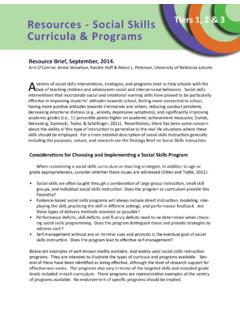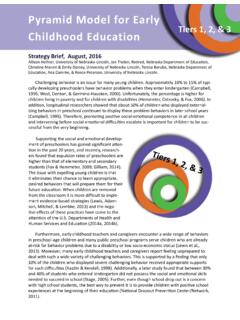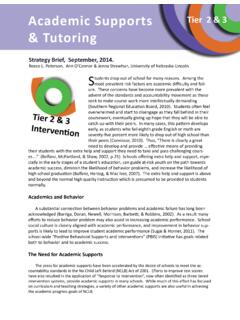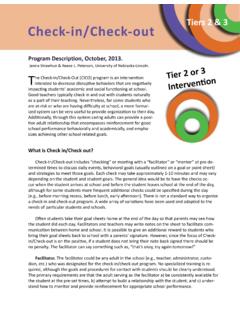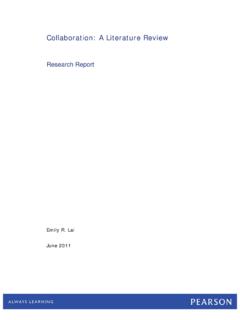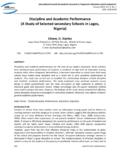Transcription of Management - University of Nebraska–Lincoln
1 classroom ManagementTier 1 Strategy Brief, June, 2016. Ana M. Damme, Elisabeth J. Kane, Amber Olson & Reece L. Peterson, University of in the Schools and Education, 2006). Researchers surveyed teachers and found that classroom manage-ment is one of the most challenging aspects of teach-ing (Merrett & Wheldall, 1993). Unfortunately, most teachers feel underprepared in the area of classroom Management and express the need for additional support and these skills are often inadequately taught in teacher-preparation curricula (Melnick & Meister, 2008; Ritz, Noltemeyer, David, & Green, 2014; Brophy, 1988) What is classroom Management ? classroom Management is a broad topic that gen-Teachers with effective classroom Management skills establish and enforce a well-mon-itored system of rules and procedures that deter inappropriate and off-task behavior (Emmer, Evertson, & Anderson, 1980), leading to increased student academic engagement and achievement.
2 These skills enhance teaching ability (National Council for Accreditation of Teach-er Education, 2008) and are related to positive academic performance and decreased inappro-priate behavior (Arbuckle & Little, 2004). Additionally, if implemented appropriately, classroom Management strategies can decrease teacher burnout (Aloe, Amo, & Shanahan, 2014), and promote a positive school climate (Mitchell & Bradshaw, 2013). Schools in all settings ( , rural, suburban, urban) report student behavior problems in the classroom , indicating the overall need for classroom Management training regardless of school location (Coalition for Psychol-erally describes a group of strategies that seek to establish and sustain an orderly environment so students can engage in meaningful academic learning (Evertson & Weinstein, p.))
3 4, 2006). Kratochwill ( ) described skills involved in classroom Management : Developing caring relationships with students; Organizing and implementing effective instructions that optimize student learning; Using group Management strategies that facilitate student engagement; Promoting student development of social skills and self-regulations; Using appropriate interventions that target student behavioral issues; Monitoring student progress; and, Anticipating potential 1 InterventionClassroom Management 2 The purpose of classroom Management strategies is to maintain a learning environment that promotes positive interaction, access to learning, and enhanced student achievement (Aloe, Amo, & Shanahan, 2014; Emmer, Evert-son, & Anderson, 1980), while also sustaining control over students problematic behavior (Mitchell & Bradshaw, 2013).
4 classroom man-agement strategies need to be tailored to each classroom because of varying student char-acteristics, student cultural backgrounds and language skills, and developmental and mental health Management has been heavily stud-ied, researchers continue to work on identify-ing classroom Management principles and on translating research findings into practice. The literature on classroom Management is vast. Much of the literature focuses on identifying the evidence base for specific strategies or skills. It is beyond of our scope to provide a thorough review of all possible classroom Management strategies. However, researchers have attempted to scientifically review the classroom Management literature to determine which practices are ev-idence-based. Simonsen and colleagues (2008) used similar evidence-based standards to those of the What Works Clearinghouse, and found 21 general classroom Management practices that met the criteria as evidence-based.
5 The researchers considered classroom Management strategies evidence-based if they met the fol-lowing three criteria: (1) evaluated using sound experimental design and methodology; (2) demonstrated to be effective; and (3) supported by at least three empirical studies published by peer-refereed journals (Simonsen et al., 2008). The strategies are grouped into five empirically supported characteristics of effective classroom Management (see Figure 1). Figure 1. Evidence-based Practices Reviewed by Simonsen et al., 2008 Evidence-based Practices1. Maximize Structure and Predicability High classroom structure ( , amount of teacher directed activity) Physical arrangement that minimizes distraction ( , walls, visual dividers, etc.) and crowding2. Post, Teach, review , Monitor, and Reinforce Expectations Post, teach, review , and provide feedback on classroom expectations Active supervision3.
6 Actively Engage Students in Observable Ways Rate of opportunities to respond (OTRs) Response cards Direct instruction Computer assisted instruction Classwide peer tutoring Guided notes What do we know about classroom Management ?The topic of classroom Management is sup-ported by a large body of literature in the field of educational psychology research. Many researchers dedicate their academic career to improving class-room Management and numerous books have been written on the topic. A general search of classroom Management using Academic Search Premier, EBSCO host, and PsycINFO yielded 3,862 scholarly peer-reviewed journal articles and books ranging in published dates from 1909 to 2015. Although these conditions. When students exhibit difficul-ties, teachers need to assess and understand the needs of the student in order to evoke de-sired and successful behavior, as well as select an effective classroom Management strategy (Jones & Jones, 2010).
7 3. Incorporate Instructional Methods. Effec-tive classroom Management strategies utilize instructional methods that facilitate optimal learning and meet the unique needs of stu-dents. Such instructional methods should actively engage students so that they are motivated to learn and behave well (Jones & Jones, 2010). Simple instructional changes such as offering students a choice can reduce the likelihood of problem behaviors while increasing academic engagement (Lane et al., 2015). Visit the linked webpage for more information on instructional Foster Student Autonomy. classroom man-agement should include a variety of counseling and behavioral methods that facilitate student autonomy and foster self-monitoring of their own behavior (Jones & Jones, 2010). Research-ers have identified a variety of ways that teach-ers can promote student autonomy (Dickinson, 1992).
8 Teachers should encourage and praise students for being independent and convinc- classroom Management 3 classroom ManagementThe literature suggests that classroom man-agement strategies should be comprehensive in that they aim to evoke student cooperation, minimize student misconduct, facilitate interven-tions when misconduct occurs, facilitate aca-demic activities, and maximize student engage-ment (Brophy, 1988). There are four necessary components to ensure that classroom manage-ment is comprehensive and effective (Jones & Jones, 2010).1. Positive Climate. In order to prevent many classroom problems, teachers should cultivate positive relationships and appropriate classroom behavior standards to create clear expectations and a safe environment (Jones & Jones, 2010).
9 Teacher-student relationships and peer relation-ships can increase students sense of safety and comfort in the classroom . Also, establishing community support and positive parent-teacher relationships is beneficial (Jones & Jones, 2010).2. Empirically Supported Strategies. Teach-ers should use strategies that are empirically supported and selected based on the individual needs of the classroom and students. It is neces-sary to ensure that students basic needs are met, because students learn and behave best in 4. Use a Continuum of Strategies to Acknowledge Appropriate Behavior Specific and/or contingent praise Classwide group contingencies Classwide group contingencies in combination with other strategies ( , self- Management and peer-monitoring, establishing and teaching expectations, social skills training) Behavior contracting Token economies5.
10 Use a Continuum of Strategies to Respond to Inappropriate Behavior Error corrections for academic performance and behavior Performance feedback Differential reinforcement Planned ignoring plus contingent praise and/or instruction of classroom rules Response cost Timeout from reinforcementing students that they are capable of learning independently. Dickinson (1992) suggests that teachers deliberately set up opportunities for students to exercise their independent Management strategies tend to be organized under two types of strategies: pro-active and reactive. Proactive approaches focus on the antecedents ( , the event that occurs before the behavior) and consequences ( , the event that occurs after the behavior) of student behavior in an attempt to prevent student mis-behavior.
